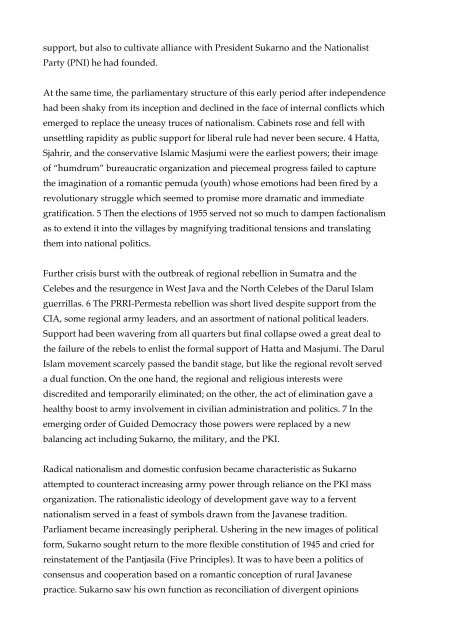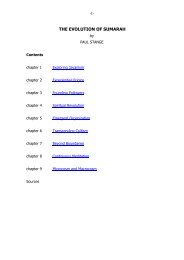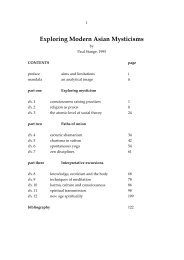Javanese Mystical and Marxist Dialectics - Paul Stange
Javanese Mystical and Marxist Dialectics - Paul Stange
Javanese Mystical and Marxist Dialectics - Paul Stange
Create successful ePaper yourself
Turn your PDF publications into a flip-book with our unique Google optimized e-Paper software.
support, but also to cultivate alliance with President Sukarno <strong>and</strong> the NationalistParty (PNI) he had founded.At the same time, the parliamentary structure of this early period after independencehad been shaky from its inception <strong>and</strong> declined in the face of internal conflicts whichemerged to replace the uneasy truces of nationalism. Cabinets rose <strong>and</strong> fell withunsettling rapidity as public support for liberal rule had never been secure. 4 Hatta,Sjahrir, <strong>and</strong> the conservative Islamic Masjumi were the earliest powers; their imageof “humdrum” bureaucratic organization <strong>and</strong> piecemeal progress failed to capturethe imagination of a romantic pemuda (youth) whose emotions had been fired by arevolutionary struggle which seemed to promise more dramatic <strong>and</strong> immediategratification. 5 Then the elections of 1955 served not so much to dampen factionalismas to extend it into the villages by magnifying traditional tensions <strong>and</strong> translatingthem into national politics.Further crisis burst with the outbreak of regional rebellion in Sumatra <strong>and</strong> theCelebes <strong>and</strong> the resurgence in West Java <strong>and</strong> the North Celebes of the Darul Islamguerrillas. 6 The PRRI-Permesta rebellion was short lived despite support from theCIA, some regional army leaders, <strong>and</strong> an assortment of national political leaders.Support had been wavering from all quarters but final collapse owed a great deal tothe failure of the rebels to enlist the formal support of Hatta <strong>and</strong> Masjumi. The DarulIslam movement scarcely passed the b<strong>and</strong>it stage, but like the regional revolt serveda dual function. On the one h<strong>and</strong>, the regional <strong>and</strong> religious interests werediscredited <strong>and</strong> temporarily eliminated; on the other, the act of elimination gave ahealthy boost to army involvement in civilian administration <strong>and</strong> politics. 7 In theemerging order of Guided Democracy those powers were replaced by a newbalancing act including Sukarno, the military, <strong>and</strong> the PKI.Radical nationalism <strong>and</strong> domestic confusion became characteristic as Sukarnoattempted to counteract increasing army power through reliance on the PKI massorganization. The rationalistic ideology of development gave way to a ferventnationalism served in a feast of symbols drawn from the <strong>Javanese</strong> tradition.Parliament became increasingly peripheral. Ushering in the new images of politicalform, Sukarno sought return to the more flexible constitution of 1945 <strong>and</strong> cried forreinstatement of the Pantjasila (Five Principles). It was to have been a politics ofconsensus <strong>and</strong> cooperation based on a romantic conception of rural <strong>Javanese</strong>practice. Sukarno saw his own function as reconciliation of divergent opinions




